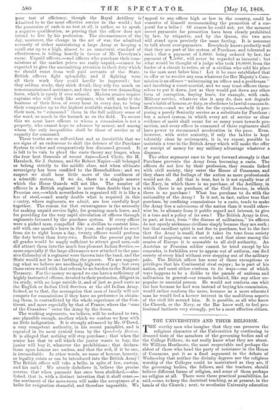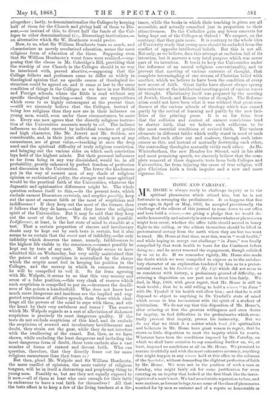THE UNIVERSITIES AND THEIR RELIGION.
THE worthy men who imagine that they can preserve the religious character of the Universities by continuing to demand tests of the members of the governing bodies and of the College Fellows, do not really know what they are about. Sir William Heathcote, the most respectable and perhaps the ablest of those who head the party of resistance in the House of Commons, put it as a final argument in the debate of Wednesday that neither the divinity degrees nor the religious worship of the Colleges could be maintained as they are, if the governing bodies, the fellows, and the teachers, should believe different forms of religion, and some of them perhaps no religion at all. There were three practical possibilities, he said,—one, to keep the doctrinal teaching, as at present, in the hands of the Church ; next, to secularize University education altogether ; lastly, to denominationalize the Colleges by keeping half of them for the Church and giving half of them to Dis- sent,—or instead of this, to divert half the funds of the Col- leges to other denominational (i.e., Dissenting) institutions,— an alternative which Sir W. Heathcote would prefer.
Now, to us, what Sir William Heathcote fears so much, and characterizes as merely secularized education, seems the most religious form of education of the three. Supposing even that Sir William Heathcote's worst fears were realized,—sup- posing that the clause in Mr. Coleridge's Bill, providing that the worship of our Church in the Colleges should in no way be interfered with, proved abortive,—supposing that the College fellows and professors came to differ so widely in theological opinion that no specific course of theological in- struction could be agreed on, and it came at last to the same condition of things in the Colleges as we have in our British and Foreign schools, where the Bible is read without any specific theological teaching,—and these are suppositions which seem to us highly extravagant at the present time, —still we sincerely believe that the Colleges, instead of being less religious than they now are in their influence on young men, would, even under these circumstances, be more so. Every one now agrees that the directly religious instruc- tion of the Universities amounts nearly to nil. The indirect influences no doubt exerted by individual teachers of genius and high character, like Mr. Jowett and Mr. Seddon, are considerable, and, in their joint effects on young men of any earnestness, are of great value,—teaching at once the deep need and the spiritual difficulty of truly religious conviction, and bringing out the various sides on which such conviction lays hold of the highest minds. But their personal influences so far from being in any way diminished, would be, in all probability, greatly enhanced by perfect freedom of profession and discussion in the Universities. The fewer the hindrances put in the way of earnest men of any shade of religious opinion or ecclesiastical polity, the stronger and more spiritual would be the practical faith of the Universities, whatever the dogmatic and opinionative differences might be. The whole question reduces itself to this,—do the present tests, which exclude earnest Dissenters certainly, and sceptics possibly, keep out the most of earnest faith or the most of scepticism and indifference ? If they keep out the most of the former, then it follows that they do harm,—that they lower the religious spirit of the Universities. But it may be said that they keep out the most of the latter. We do not think it possible. Indifference, at least, is the last state of mind to stumble at a test. That a certain proportion of sincere and involuntary doubt may be kept out by such tests is certain, but it also seems to us certain that the worst sort of infidelity,—the only infidelity which deserves the name, namely, faithlessness to the highest life visible to the conscience,—cannot possibly be kept out by tests of any sort. Mr. Walpole seems to have admitted this on Wednesday, but very oddly maintained that the poison of such scepticism is neutralized by the shame which the sceptic must feel in keeping his position in the Colleges, and the secrecy in which in common decency
he will be compelled to veil it. So far from agreeing with Mr. Walpole, it seems to us that this very secrecy and sense of a false position,—this very cloak of reserve which such scepticism is compelled to put on,—increases the deadli- ness of the poison a hundredfold. Who does not know how much more dangerous and insidious are the implied and sug- gested scepticisms of allusive speech, than those which chal- lenge all the powers of the mind to cope with them, and stir the heart by their very awfulness and terror ? The reserve which Mr. Walpole regards as a sort of alleviation of dishonest scepticism is precisely its most dangerous quality. If the tests do not exclude scepticism of this kind, and do exclude the scepticism of avowed and involuntary bewilderment and doubt, they strain out the gnat, while they do not interfere with the swallowing of the camel. But, then, as we have
shown, while excluding the least dangerous and including the most dangerous form of doubt, these tests exclude also a vast number of forms of earnest and devout faith. Who can question, therefore, that they directly fence out far more religious earnestness than they fence in?
But then, plead Mr. Walpole and Sir William Heathcote, the mere conflict of opinions, the mere variety of religious tongues, will be in itself a distracting and perplexing thing to young men. Possibly so, but are they not equally exposed to it now,—all of them at least who care enough for their faith
to endeavour to have a real faith for themselves ? All that the tests effect is to keep a few of the living teachers at a dis-
tance, while the books in which their teaching is given are all accessible, and actually consulted just in proportion to their attractiveness. Do the Catholics gain any fewer converts for being kept out of the Colleges at Oxford ? We suspect, on the contrary, that they gain more. It is contrary to the whole idea of University study that young men should be secluded from the conflict of opposite intellectual beliefs. But this is not all Not only, as we believe, does this attempt at exclusion fail of its intention, but it answers a very fatal purpose which was never part of its intention. It tends to keep the Universities under the influence of an unreal religious conventionality, and to prevent that meeting of various currents of thought, that complete intermingling of one stream of Christian belief with another, which we believe to have been the condition of every new access of faith. Great faiths have almost always sprung into existence at the intellectual meeting-point of various waves of thought. Christianity itself was prepared by the meeting of Jewish, Greek, and Roman trains of thought. The Reform- ation could not have been what it was without that great con- fluence of the various schools of theology which was caused partly by the revival of learning and partly by the new faci-
lities of the printing press. It is so far from true that the collision and contest of earnest convictions tend to shatter faith, that we believe such collisions to be- the most essential conditions of revived faith. The various elements in different faiths which really stand in need of each other, find each other out and coalesce, through such inter- course as this, and instead of mutually destroying each other, the contending theologies mutually vivify each other. As Mr. Winterbotham, the new Member for Stroud, said in his able and most promising speech, we sincerely believe that the com- plete removal of these dogmatic tests from both Colleges and Universities, far from injuring the cause of true religion, will give Christian faith a fresh impulse and a new and more vigorous life.































 Previous page
Previous page